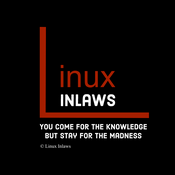We have made it! Six years in the making and still going strong. With a steadily increasing audience of - wait for it - at least ten listeners. When they can't get to sleep or have nothing else to do. Or - gosh - want to learn something. Like what's Usenet. And why Linux has been so important (yes, it all will be revealed in this episode!). Including a crash course on operating system design (including the operating system war) and CPU design history. Never mind how humorous works. So wars or not, you have an hour to spare, can't get to sleep or want to learn something, never mind want to know why our beloved operating system conquered the world and how humor works and much, much more, you certainly don't want to miss this episode! (Ok, marketing made us do it - before Martin fired them once again).
Links
Minix: https://www.minix3.org
The OS war: https://groups.google.com/g/comp.os.minix/c/wlhw16QWltI?pli=1
The Usenet: https://en.wikipedia.org/wiki/Usenet
GNU Hurd: https://en.wikipedia.org/wiki/GNU_Hurd
IBM's RISC history: https://web.archive.org/web/20060503190348/http://www-03.ibm.com/ibm/history/documents/pdf/rs6000.pdf
Car Talk: https://www.cartalk.com
Martin's ancient server: https://en.wikipedia.org/wiki/ProLiant
Krentenbollen: https://www.toineskitchen.com/recipes/krentenbollen
Christmas pudding recipe (not for faint-hearted): https://www.bbcgoodfood.com/recipes/classic-christmas-pudding
Chromebooks: https://www.google.com/chromebook
Arch on Chromebooks (Chris' talk): https://web.archive.org/web/20211025175723/https://frab.openrheinruhr.de/system/event_attachments/attachments/000/000/020/original/Arch_Chromebook.pdf?1541482424
